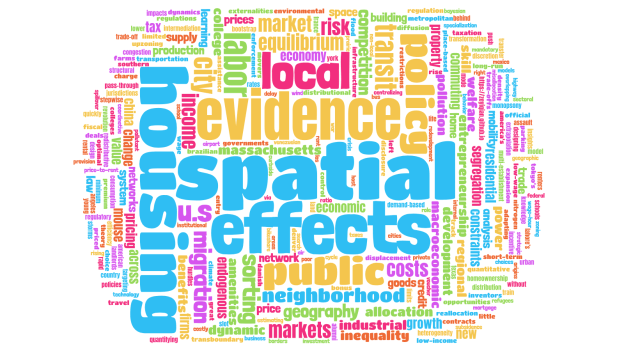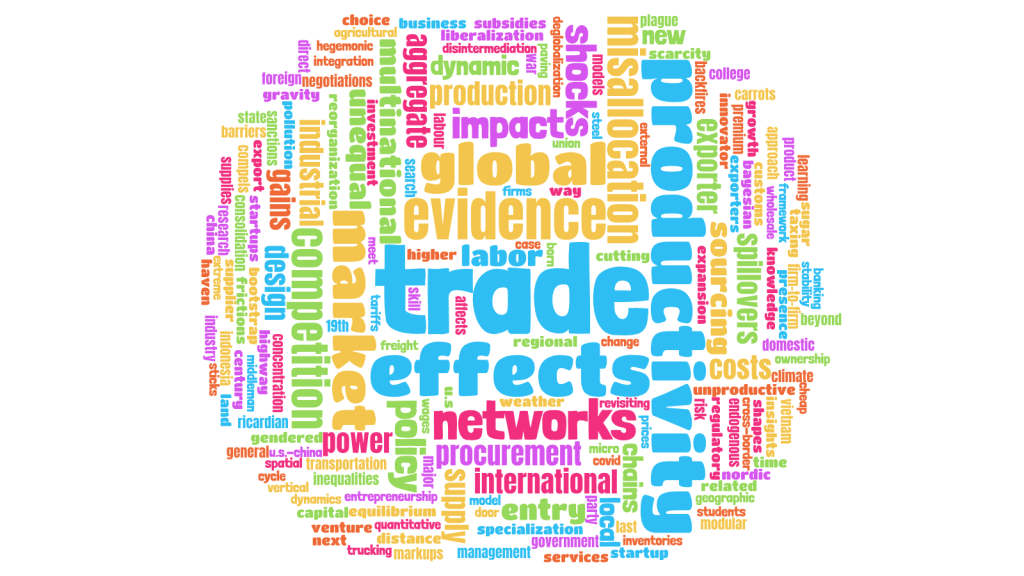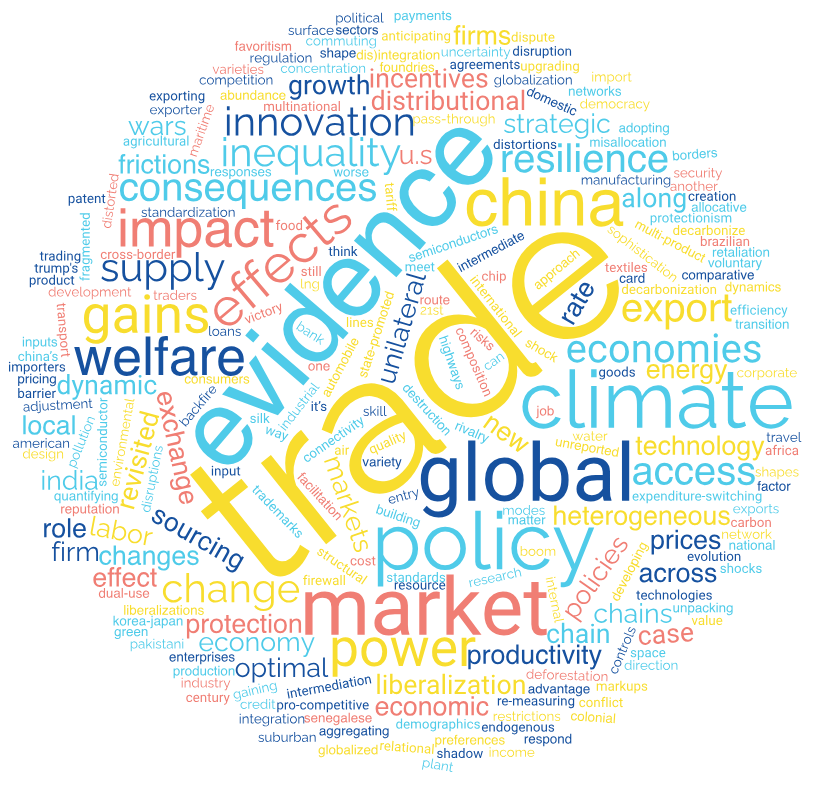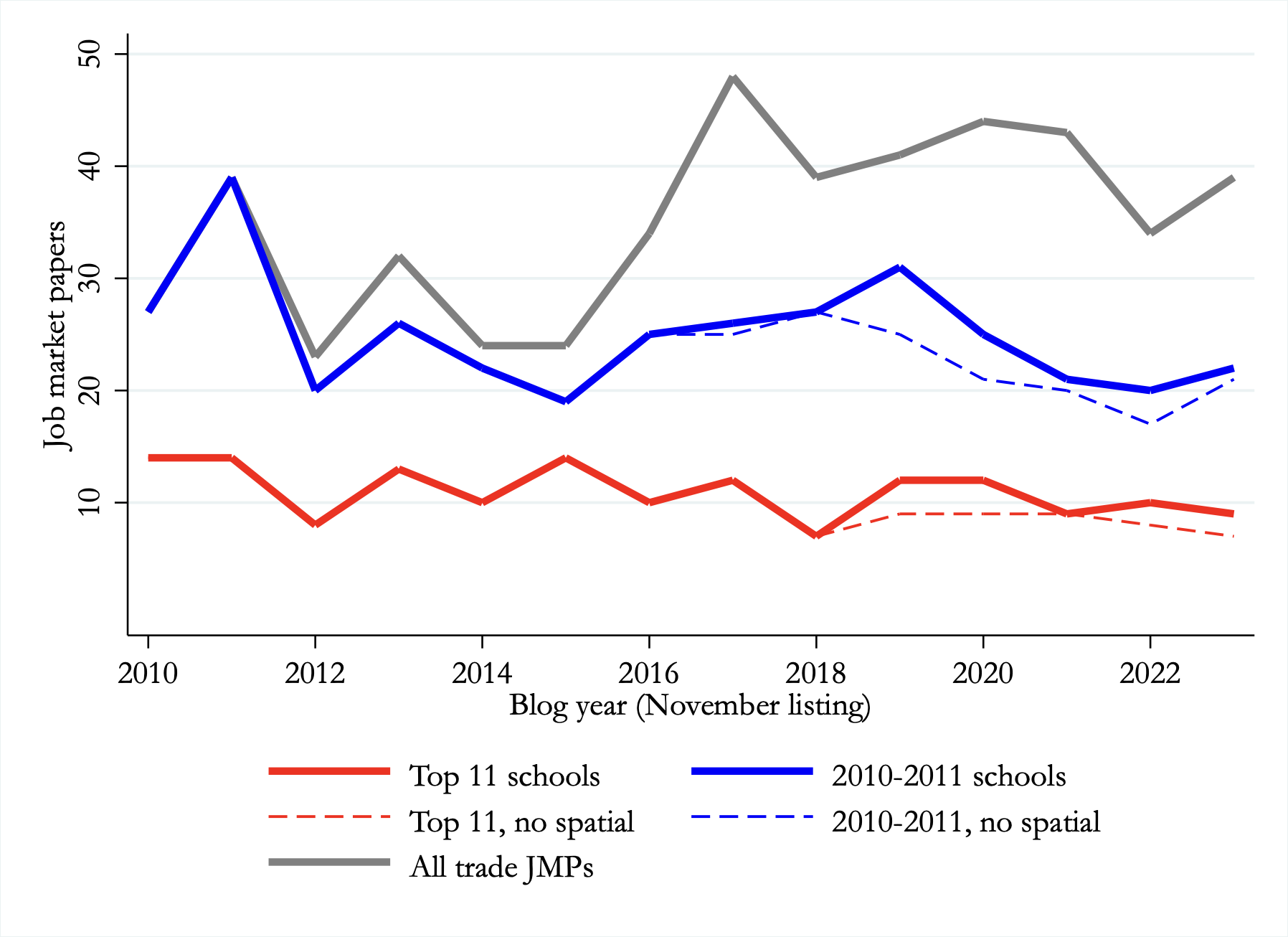Here’s a list of job-market candidates whose job-market papers fall within spatial economics, as defined by me quickly skimming webpages and two dozen candidates who responded on Twitter. I’m sure I missed folks, so please add them in the comments.
Here’s a cloud of the words that appear in these papers’ titles:
Yuanhang Yu (LSE) – Pollution Without Borders: Transboundary Air Pollution and the Geography of Pollutant Control Policy
Po-Shyan Wu (Indiana) – Assault on the Low-Wage Economy: Federal Wage-Hour Law and Southern Industrial Development
Jacob Wright (Minnesota) – On the Spatial Distribution of Colleges
Martin Wiegand (UPF) – Cities with Benefits
Zhichun Wang (Yale) – The Expansion and Dynamic Equilibrium Effects of Institutional Landlords
Óscar Vilargunter (Toulouse) – Spatial Effects of the Minimum Wage
Michael Tueting (St. Gallen) – Climate Change, Income Inequality, and Migration in a Spatial Economy
Tuyetanh Tran (Yale) – The Trade-Offs of Curbside Parking: Evidence from Demand-Based Pricing
Anya Tarascina (Wisconsin) – The Value of Intermediation in Bikeshare
Idil Tanrisever (UCI) – Upzoning and Neighborhood Change: Evidence from Los Angeles
Caterina Soto Vieira (LSE) – Home Production in the City
Christopher Sims (Northwestern) – The Origins of the Nitrogen Revolution
Jacob Shepard (Arizona State) – Spatial Mobility and the Macroeconomic Effects of Housing Policy
Jin Seok Park (USC) – Priced Out of Entrepreneurship? Rising Local Home Prices Lower Economic Opportunities for Young Renters
Bas Sanders (Harvard) – A New Bayesian Bootstrap for Quantitative Trade and Spatial Models
Álvaro Sánchez-Leache (CEMFI) – The Internal Geography of America’s Housing Crisis
Matteo Saccarola (Berkeley) – Geographic Price Extrapolation, Learning, and Housing Search: Evidence from Danish Movers
Brietta Russell (Oregon) – Short-Term Rental Regulations, Enforcement, and Host Behavior: Evidence from Denver
Francesco Ruggieri (Chicago) – Overlapping Jurisdictions and the Provision of Local Public Goods in U.S. Metropolitan Areas
Vincent Rollet (MIT) – Zoning and the Dynamics of Urban Redevelopment
Christina Qiu (Yale) – Endogenous Transfer Networks Under Spatial Risk
Zeyi Qian (Clark University) – Trade Costs, Entry Costs, and Regional Economic Growth in China
Helena Pedrotti (NYU) – Local Discretion in Low-Income Housing Policy: Evidence from France
Giovanni Paolo Mariani (ULB ECARES) – The Value of Local Public Goods: Evidence from Massachusetts’ Property Tax Limits
Junni Pan (Purdue) – Migration Restrictions, College Choices, and Spatial Skill Sorting
Julian Oolman (Illinois) – Endogenous Consumption Amenities of the Country Mouse and City Mouse
Fernando Ochoa (NYU) – Targeting and Price Pass-Through in Housing Voucher Design
Matias Navarro (Cornell) – On the Right Track? Designing Optimal Public Transit Contracts
Alberto Nasi (Bocconi) – Mortgage Rates and the Price-to-Rent Ratio Across Space
Jordan Mosqueda (UCSD) – Equilibrium Commuting Costs: The Role of Private and Public Transit
Iris Margetis (Michigan State) – The Effects of a Mandatory Flood Risk Disclosure Law on Rent Prices and Residential Sorting in Texas
Anna Lukianova (Wisconsin) – Income Taxation, Entrepreneurship, and Inequality in the U.S.
Feng Lin (Chicago) – Sorting, Displacement, and the Limited Welfare Benefits of Non-Local Firms
Furkan Kilic (Chicago) – Spatial Allocation of Inventors, Knowledge Diffusion and Growth
Aja Kennedy (Tufts) – Local Spillover Effects of Density Bonus Policy on Housing Production: Evidence in Massachusetts
Zane Kashner (Stanford GSB) – Building with Externalities: Local Governments and Wind Farms
Nathan Jones (UPF) – Pricing Out the Poor: Income Segregation and Housing Supply Regulation
Richard Jin (Berkeley) – College Alumni Networks and Mobility Across Local Labor Markets
Jiahao Jiang (Virginia) – Rise of Homeownership in China: Insights from a Life Cycle Analysis
Yuyang Jiang (Princeton) – Strategic Transportation Investment and Coordinative Policies: Evidence from the U.S. Highway Network
Yikuan Ji (UMD) – Travel Mode Choice and Distributional Impacts of Congestion Charge Policy in New York City
Razi Iqbal (Michigan) – Sectoral and spatial reallocation via multi-establishment firms
Ji Hwan Kim (UPenn) – Adapting to Storms in the U.S.: A Spatial Dynamic Analysis
Zong Huang (Stanford) – The Redistributive and Efficiency Effects of Property Taxes
Bisma Haseeb Khan (Toronto) – Public Transit, Residential Sorting and Labor Supply: Evidence and Theory from Lahore’s Bus Rapid Transit System
Raymond Han (MIT) – Equilibrium Effects of Neighborhood Schools
Lucy Hackett (Berkeley ARE) – Land subsidence: Environmental risk in housing markets in Mexico City
David H. Buller (Illinois) – Estimating Spatial Heterogeneity in the Labor Market Effects of Place-Based Business Incentive Deals
Gabrielle Grafton (Brown) – The Great Migration and Those Left Behind
Daniel Gold (Wisconsin) – Regulatory Hurdles and Costly Delay in Housing Development
Sebastian Espinoza Rojas (UCL) – Market Power and Local Labor Markets
Plinio Dias Bicalho Jr (Boston U) – Quantifying the Macroeconomic Effects of Tax Competition: the Brazilian “Fiscal War”
Agustín Deambrosi (Penn State) – When, where, and how quickly? A model of Venezuelan stepwise migration with network effects, credit constraints, and official assistance
Lindsey Currier (Harvard) – Competition in U.S. Infrastructure
Benjamin Couillard (Toronto) – Build, Baby, Build: How Housing Shapes Fertility
Beau Bressler (UC Davis) – Building Segregation: The Long-Run Neighborhood Effects of American Public Housing
Lukas Boehnert (Oxford) – The Regional Specialization Trade-off
Devin Bissky Dziadyk (Toronto) – Little School on the Prairie: A Push for Structural Transformation
Aditya Bhandari (Chicago) – Technology and the Geography of Industrial Policy
Sebastián Bauer (Stanford GSB) – Competition and Welfare in Airport Slot Allocation
Elif Basaran (Penn State) – Refugees, Amenities, and the Skill Premium
Mark Bamba (Princeton) – The Centralizing Effects of Tokyo’s Train System
Abdelrahman Amer (Toronto) – Monopsony in Space: Commuting & Labor Market Power
Elena Aguilar (Princeton) – Credit Constraints, Learning, and Spatial Misallocation







